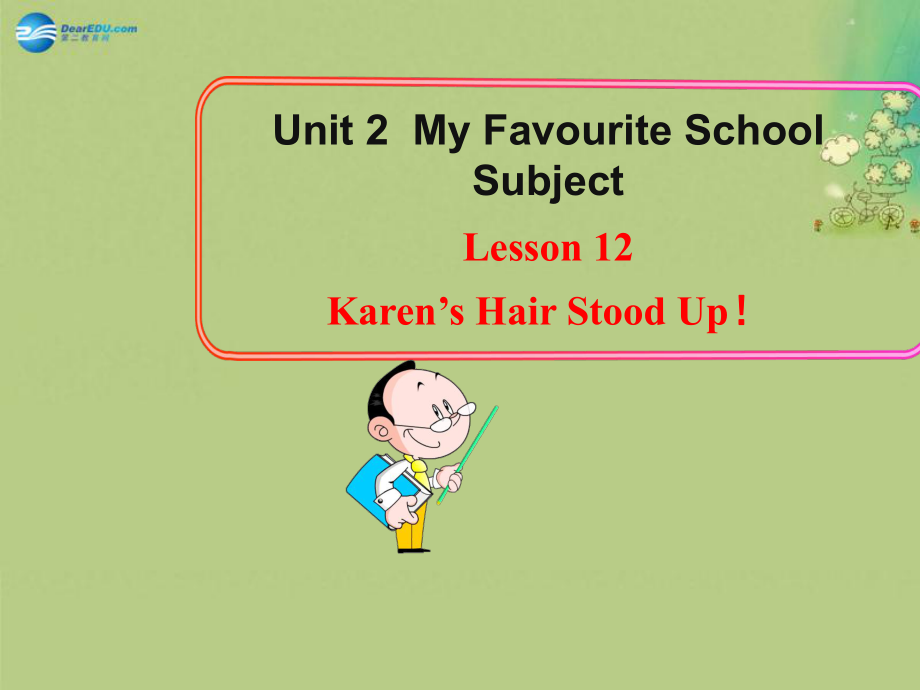《冀教初中英語(yǔ)八上《Lesson 12 Karen's Hair Stood Up!》PPT課件 (1)》由會(huì)員分享���,可在線閱讀��,更多相關(guān)《冀教初中英語(yǔ)八上《Lesson 12 Karen's Hair Stood Up!》PPT課件 (1)(23頁(yè)珍藏版)》請(qǐng)?jiān)谘b配圖網(wǎng)上搜索�。
1、Unit 2 My Favourite School SubjectLesson 12Karens Hair Stood Up���!Lead inTalk about the favourite subjects Do you like your school?Is there anything interesting in your class?a picture of the oceanhave a discussionread aloud 2014年年5月月23日日 星期一星期一 晴晴 今天今天,我學(xué)著在家里幫媽媽包粽子�����。這粽子還真大�����。雖我學(xué)著在家里幫媽媽包粽子�。這粽子還真大�����。雖然沒有熟然沒
2���、有熟,不過看著油油的樣子真想吃一口。我學(xué)著媽媽一不過看著油油的樣子真想吃一口�。我學(xué)著媽媽一步一步的進(jìn)行下去步一步的進(jìn)行下去,媽媽很耐心的教我媽媽很耐心的教我,每當(dāng)我做對(duì)了一步每當(dāng)我做對(duì)了一步,媽媽媽那和藹的笑容便浮上臉頰�。我的心里暖滋滋的�。終于媽那和藹的笑容便浮上臉頰。我的心里暖滋滋的����。終于,我我的第一個(gè)的第一個(gè)“作品作品”完成了。真是棒極了�����。我高興的手舞足完成了���。真是棒極了�。我高興的手舞足蹈����。哎蹈。哎,包粽子還真是有些不容易��。我們一定不能浪費(fèi)包粽子還真是有些不容易����。我們一定不能浪費(fèi),這些這些都是大人們辛苦的勞動(dòng)果實(shí)。都是大人們辛苦的勞動(dòng)果實(shí)����。中文日記的寫法中文日記的寫法Presentatio
3��、nFriday January 28,2014 sunny It doesnt matter that the air-conditioner has been broken.But my notebook-computer also was broken.I really dont know what to do.So I went to play basketball.At first,there was no person playing basketball.So I played basketball alone.A few minutes later,some students c
4����、ame to play.So we played together.Of course,we had a match.And it lasted two hours.After the match,I felt I would be dead.I was too tired.英文日記的寫法英文日記的寫法 1.年�����、月�����、日都寫時(shí)��,通常以月����、日、年����、月、日都寫時(shí)�,通常以月��、日、年為順序��,月份可以縮寫��,日和年用逗年為順序��,月份可以縮寫����,日和年用逗號(hào)隔開。例如:號(hào)隔開���。例如:December 18,2011或者或者Dec.18,2011.星期和日期寫在左上角���,天氣寫星期和日期寫在左上角,天氣寫在右上角在
5��、右上角,日期格式用月日年日期格式用月日年(美式美式)或或日月年(英式)都可以�。日月年(英式)都可以。日記格式日記格式2.如果要寫星期�,星期要緊挨日期,它既可以放在日期前如果要寫星期��,星期要緊挨日期,它既可以放在日期前面�����,也可以放在日期后面��,星期也可以省略不寫�����。星期和面����,也可以放在日期后面,星期也可以省略不寫�����。星期和日期之間不用標(biāo)點(diǎn)����,但要空一格,星期也可縮寫�����。例如:日期之間不用標(biāo)點(diǎn),但要空一格�,星期也可縮寫。例如:Thursday Dec.22,2011或或Dec.22����,2011 Thursday�����。3.天氣情況必不可少�。天氣一般用一個(gè)形容詞如天氣情況必不可少。天氣一般用一個(gè)形容詞如:Sunny,
6�、Fine,Rainy,Snowy等表示。天氣通常位于日記的右上角��。等表示�����。天氣通常位于日記的右上角�����。Read quickly and answer the questions:Nameartsocial studiesphysicsP.E.Brians groupJenny and Bills groupKaren and Jacks groupDanny and Lisas groupFavorite Subjects 1.How many groups are mentioned(被提到被提到)in the diary?What are they?2.What are their favo
7、urite subjects?Read carefully and try to fill in the table:What did they present?Brians group BrianJenny and Bill Jenny BillKaren and Jack Karen JackDanny and LisaDanny Lisa bring a picture of the oceanplay some Chinese music,read some letters and e-mails from her friend in Chinashow the class lots
8���、of photos of Beijingput very small tea leaves on the deskcomb her hair ten times very quickly,put the comb beside the tea leavesplay basketballshow them some exercises1.I have made many new friends.make friends 表示表示“交朋友交朋友”���。例如:例如:Although she is new here,she makes many new friends.Language Points2.W
9、e each brought a painting to classeach作主語(yǔ)的同位語(yǔ)��,放在主語(yǔ)的后面���,此時(shí)的主語(yǔ)和作主語(yǔ)的同位語(yǔ)���,放在主語(yǔ)的后面,此時(shí)的主語(yǔ)和謂語(yǔ)都用復(fù)數(shù)形式�。謂語(yǔ)都用復(fù)數(shù)形式。They each want to sign the paper他們每個(gè)人都想在紙他們每個(gè)人都想在紙上簽名���。上簽名����。each還有其他用法:還有其他用法:each作主語(yǔ)��,謂語(yǔ)用第三人稱單數(shù)形式����。作主語(yǔ)�����,謂語(yǔ)用第三人稱單數(shù)形式����。There are many people there����,each has a newspaper那里有許多人�,每人有一張報(bào)紙。那里有許多人����,每人有一張報(bào)紙。Each of us
10�����、 goes to school on foot我們每個(gè)人都步行上學(xué)����。我們每個(gè)人都步行上學(xué)。each作定語(yǔ)時(shí),后接單數(shù)可數(shù)名詞�����,謂語(yǔ)動(dòng)詞也用單數(shù)�����。作定語(yǔ)時(shí)�,后接單數(shù)可數(shù)名詞,謂語(yǔ)動(dòng)詞也用單數(shù)�。這時(shí)的這時(shí)的each是形容詞。是形容詞����。Each student has a dictionary每個(gè)學(xué)生都有一本字典每個(gè)學(xué)生都有一本字典。each作狀語(yǔ)�����。作狀語(yǔ)�。You will choose a card each你們每人可以挑一張卡片。你們每人可以挑一張卡片����。3.The picture always reminds me of that holiday.(1)remind sb.of sth.表示表示
11�����、“使某人想起某事使某人想起某事”It reminds me of my best friends.(2)remind sb.to do sth.表示表示“提醒某人做某事提醒某人做某事”Please remind me to buy some fruit after work.4.Everyone was very surprised.everyone =everybody表示表示“每人����,人人���,只能指人每人��,人人����,只能指人”��。everyone 作主語(yǔ)時(shí)或作主語(yǔ)時(shí)或“every+單數(shù)名詞單數(shù)名詞”作主語(yǔ)時(shí)����,作主語(yǔ)時(shí)��,謂語(yǔ)動(dòng)詞用單數(shù)形式����。謂語(yǔ)動(dòng)詞用單數(shù)形式�。例如:例如:Everyone has be
12��、autiful bags in our school.every one 即可指人�,也可指物。后常接即可指人��,也可指物�����。后常接“of+名詞名詞 或代詞的復(fù)數(shù)或代詞的復(fù)數(shù)”����,強(qiáng)調(diào)整體中的每個(gè)人。���,強(qiáng)調(diào)整體中的每個(gè)人���。例如:例如:Every one of us is going to Shanghai.everyone與與every one (1)everyone=everybody是代詞,是是代詞�,是“每個(gè)人;人人��;每個(gè)人�����;人人;大家大家”的意思��,不指具體哪一個(gè)人�,作主語(yǔ)時(shí),謂語(yǔ)用的意思����,不指具體哪一個(gè)人,作主語(yǔ)時(shí)�����,謂語(yǔ)用第三人稱單數(shù)形式����。第三人稱單數(shù)形式。Everyone can do it誰(shuí)
13���、都可以做此事。誰(shuí)都可以做此事��。Everyone is here except Tom除湯姆外大家都到了�。除湯姆外大家都到了��。(2)everyone只能指人���,不能指物;只能指人��,不能指物�;every one既可人,也可既可人���,也可指物�����。指物��。如:如:Every oneEveryone in our class likes playing football我們班人人喜歡踢足球����。我們班人人喜歡踢足球��。There is something wrong with every one of the bikes每每輛自行車都有毛病�����。輛自行車都有毛病。(3)every one可以和可以和of連用構(gòu)成短語(yǔ)��,而連
14����、用構(gòu)成短語(yǔ),而everyone則不能�。則不能。如:如:Every one of us is getting ready for the exam我們每個(gè)人都在為考試做準(zhǔn)備��。我們每個(gè)人都在為考試做準(zhǔn)備����。5.Everyone was very surprised.surprised 意為意為“對(duì)對(duì)感到驚訝感到驚訝”,主語(yǔ)一般是人����。,主語(yǔ)一般是人����。例如:例如:We are surprised at the good news.surprising 意為意為“令人驚奇的令人驚奇的”,多形容事物的特點(diǎn)�。�����,多形容事物的特點(diǎn)。例如:例如:It is a surprising game.6.Finally,D
15�、anny and Lisa presented their favourite subjectP.E.finally,at last 和和 in the end三者皆可為三者皆可為“最后最后”。finally,表示動(dòng)作發(fā)生的順序在最后��,一般放在句首�����。表示動(dòng)作發(fā)生的順序在最后���,一般放在句首�。at last 經(jīng)過一定的困難之后����,強(qiáng)調(diào)努力的結(jié)果。經(jīng)過一定的困難之后���,強(qiáng)調(diào)努力的結(jié)果����。例如:例如:I hope that everyone is good in the end.Did the man in the shop understand him at last.Finally he went to
16、 see the famous man himself.Practice.根據(jù)句意及首字母提示完成單詞���。根據(jù)句意及首字母提示完成單詞���。1.Dont tell your s_ to others.2.My daughter wants to be an a_ because she loves drawing very much.3.In our English class,we often have d_ in groups.4.Do you r_ the girl called Mary?5.He is good at English,so I a_ him very much.ecretr
17���、tistiscussionsememberdmire.介詞填空���。介詞填空。1.Today we gave our talks _ the class _ our favourite subjects.2.My group talked _ our favourite subject art.3.Mine was a picture _ the ocean.4.It looks _ a very big city!5.She also read some letters and e-mails _ her friend _ China.6.She also made her hair stand
18����、 up _ the comb.toaboutinwithaboutoflikefrom.用所給詞的適當(dāng)形式填空。用所給詞的適當(dāng)形式填空�����。1.They might be_(surprise)at the news.surprised2.Everyone _(be)here except Wang Hua.is3.What makes you _(think)its going to rain tomorrow?think4.There are _ (leaf)in our playground.leaves5.Mr.Wood_(give)us a talk yesterday.gave6.Im
19�����、thirsty,please _(帶來)帶來)me a bottle of water.bring.漢譯英�����。漢譯英。1.每個(gè)學(xué)生都喜歡讀書��。每個(gè)學(xué)生都喜歡讀書�。_._._.Each student likes reading booksThe students each like reading booksEach of the students likes reading booksHomeworkWhat did they do?FirstBrians groupNextJenny and BillThenKaren and Jack FinallyDanny and Lisatalk about their favourite subject-arttalk about their favourite subject social studiesshow the class some physicsgive their talk to the class about P.E.Retell the diary:The golden age is before us,not behind us.黃金時(shí)代在我們面前而不在我們背后�。
 冀教初中英語(yǔ)八上《Lesson 12 Karen's Hair Stood Up!》PPT課件 (1)
冀教初中英語(yǔ)八上《Lesson 12 Karen's Hair Stood Up!》PPT課件 (1)

